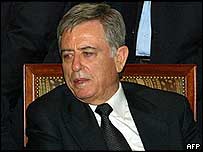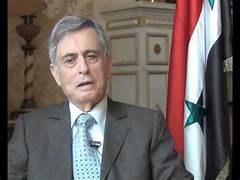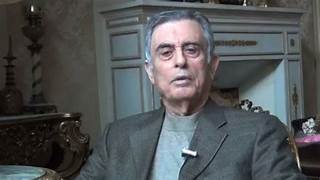Former Deputy to the President of the Syrian Arab Republic, Abdul Halim Khaddam, described Syrian President Bashar al-Assad as a “dictator who doesn’t learn from the experiences of his predecessors, whom popular revolutions ousted from power.”
This came as part of Khaddam’s response to questions posed by the German News Agency in Cairo (dpa) via email.
When asked if Bashar al-Assad learned from the experiences of his predecessors, especially given his relative youth and proximity in age to the youth who initiated the revolutions, Khaddam replied, “Bashar al-Assad is an arrogant dictator incapable of learning. He considers himself the master of knowledge and wisdom, and those around him have ingrained in him the notion that the people love him. However, due to his arrogance and psychological makeup, he cannot distinguish between right and wrong.”
He added, “His young age does not mean he is close to modernity and reform. He was raised in a household where his father was deemed the owner of Syria and that Syria was his plantation. His father never made mistakes, and whatever his father said was the truth. Bashar has adopted his father’s persona. Bashar al-Assad has actually surpassed his father’s actions in Daraa, Daraya, Sakba, Maadamiyah, Douma, Damascus, Harasta, Zabadani, Homs, Jableh, Latakia, Baniyas, Deir ez-Zor, and Hama. We have a popular saying: ‘The child is the secret of his father.'”
Khaddam ruled out the possibility of “Hezbollah,” the strong ally of the Syrian regime, escalating militarily against Israel to attract attention and relieve international pressure on the Syrian regime. He explained, “I do not believe that Hezbollah will initiate a war with Israel. It is not in their interest to do so. Moreover, such a decision would require Iranian approval. The Iranian leadership understands that involving Hezbollah in these circumstances would result in its downfall. Therefore, they do not want to lose their most important armed force outside their national borders.”
Khaddam emphasized that the statement made by businessman Rami Makhlouf, Bashar al-Assad’s cousin, that there would be no stability in Israel unless there was stability in Syria, revealed the Syrian regime’s nature of pursuing its own interests. Khaddam questioned, “If Israel’s stability is truly tied to Syria’s stability, then why doesn’t Bashar al-Assad exert pressure on Israel to withdraw from the Golan Heights, given his considerable power?”
This statement indicates the regime’s awareness of its impending end. Hence, they resort to empty slogans that won’t yield any real results. However, they might believe that some of these slogans could prolong the regime’s existence. Nonetheless, the regime’s time is up, and it will eventually fall.”
Khaddam ruled out the possibility of Bashar al-Assad staging a coup against figures close to the centers of power, such as Rami and Hafez Makhlouf, Bashar’s brother, as a corrective measure, shifting the blame onto them in an attempt to save himself and his rule. He said, “I do not expect Bashar al-Assad to stage a coup against his brother, nor will Maher do such a thing. If tension arises between them, one of them will work to eliminate the other.”
Regarding the possibility of Maher al-Assad or another figure close to the centers of power staging a coup against Bashar al-Assad, with the support of Iran, in an attempt to keep their ally Syria intact while altering its external face, Khaddam stated, “Maher al-Assad, as I previously mentioned, will not stage a coup against his brother. Even if he did, Iran would not support him. Iran is committed to supporting the regime. Additionally, there is no one in Syria who would accept the continuation of the ruling family without accountability. The Syrian people aspire to build a civil democratic state, not to continue under the rule of an oppressive, corrupt regime.”
Many political analysts have proposed scenarios in which figures close to the centers of power stage a coup against Bashar al-Assad to continue effectively holding power in Syria but under a civil façade or Sunni leadership.
Khaddam denied the existence of divisions within the ruling family in Syria and stressed that Bashar al-Assad remains the “strongest figure” in the family and the centers of power. He said, “The Assad family includes two individuals who make the decisions: Bashar and Maher al-Assad. Others are supporters and executors. However, it is no longer acceptable to discuss any possibility of the Assad family continuing in power and the perpetuation of an all-encompassing, oppressive regime.”
He said, “A regime that uses its army to suppress its citizens with tanks and artillery, resulting in more than two thousand killed and several thousand wounded, while arresting citizens and terrifying cities and rural areas, cannot continue. It is undoubtedly a fallen regime. However, the manner of its fall is connected to the evolution of events. There’s no doubt that the Syrian people are determined to hold Bashar al-Assad and all those involved with him accountable.”
Responding to a question about the Syrian regime’s ability to withstand popular protests, especially given the continued loyalty of the army and other security agencies, and the varying intensity of the protests across different Syrian provinces, the former deputy to the Syrian president stated, “After Hafez al-Assad took power, he rebuilt the armed forces and security apparatus, opened the doors of military and security colleges to the majority of Alawite students and a small minority of other Syrians. This was because he considered the army and security forces as protectors of the regime. Thus, the army and security apparatus became the main tools to maintain power. The claim that the protests aren’t of the same intensity across all Syrian provinces is not accurate. While there are some areas where people didn’t participate, it’s not because they support the regime, but rather due to their fear of the regime’s brutal repression.”
Khaddam rejected the statements that Syria is now paying the price for its supportive stance towards the resistance movements, as some Western countries, especially France, Britain, and Germany, have taken a tougher approach against the Syrian regime. He emphasized that “the concepts of resistance, resilience, and embracing resistance are all false slogans that no one believes. A resilient state does not deprive its people of freedom, persecute them, loot their resources, or oppress them. How could a state be resilient while its people are imprisoned and deprived of the most basic necessities of life, while the ruling family loots their wealth? As for attempts to target Syria, yes, Syria is indeed targeted, not from outside, but from a regime that oppresses its citizens and uses the pretext of foreign conspiracies, a baseless pretext that no Syrians believe.”
He continued, “The Syrian regime accused individuals in the Future Movement of being behind what’s happening. This is not true. The Future Movement is embroiled in what the friends and allies of the Syrian regime are stirring up against it. The Future Movement does not possess the means or the capacity to do so. Even its media outlets have taken a neutral stance toward the regime’s crimes. As for accusations against Saudi individuals, there is no truth to that, neither remotely nor closely. Syrians hold Arab countries, including the Kingdom of Saudi Arabia, responsible for their silence regarding what’s happening in Syria.”
Khaddam affirmed that there is no chance for the Syrian regime to escape the scenario of collapse. He stated, “However, this collapse is tied to the evolution of events, both internally and externally. The regime will not escape its fall through a roadmap or initiatives by some neighboring countries, including Iran and Turkey. Iran, the regime’s ally, is not trustworthy. I believe Turkey is becoming convinced that the regime is no longer fit to continue.”
He elaborated, “It is inconceivable for Syrians to remain under the rule of a regime whose tool in power is a minority that doesn’t exceed 8% of the country’s population. This is not due to sectarian reasons but because of the regime’s practices. When President Hafez al-Assad ran for presidency in March 1971, people knew he was from the Alawite community. However, they didn’t expect him to adopt a sectarian approach.”
Responding to the more severe stances taken by some Western countries, particularly France, Britain, and Germany, against the Syrian regime, Khaddam said, “We hope that this indicates a direction toward making serious decisions and taking positions that isolate the regime and exert pressure on it.”
When asked about the extent of Syrian support for a Western military strike against the regime similar to the situation in Libya, Khaddam replied, “It is premature to talk about a military strike. The international community has not reached a stage of imposing serious sanctions on the Syrian regime. If you want to understand the real standard, imagine a people being killed by their own army, which is supposed to protect them. What could they ask for or say in such a situation?”
He added, “In Libya, the rebels only sought international support when they realized that the absence of that support would lead to their destruction. They made their request very clear. This doesn’t mean they are aligning with the West or the East or calling for joining spheres of influence. In principle, Syrians do not desire foreign military intervention. However, from my perspective, the regime in Syria is not a national regime. It has lost its legitimacy and has now become an occupying force backed by a foreign state called Iran. If the international community fails to take decisive sanctions against the regime and Bashar al-Assad, then all options become legitimate.”
Khaddam stressed his intention to return to Syria after the fall of the Bashar al-Assad regime, downplaying the possibility that anyone would demand his trial then. He stated, “Yes, I was one of the key figures in the regime, but in its foreign policies. No one can evaluate me other than based on what I was involved in. I left the regime, which was like a severe blow to it. My name became alarming. Many media outlets, influenced by the regime or not, feared mentioning my name, so as not to incur the regime’s punishment.”



